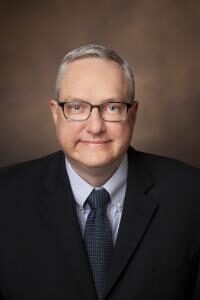by Jen Peek (G1)
 Dr. Matthew Wilson, M.D., Ph.D. is a Professor of Medicine within the Division of Nephrology and Hypertension and is the newest Faculty Advisor of Stahlman Thomas. He trained in the Vanderbilt MSTP, where he completed his PhD in Pharmacology with Lee Limbird on the structure-function relationships of alpha-2 adrenergic receptors. Dr. Wilson then stayed at Vanderbilt as the founding member of the Harrison Society Physician Scientist Training Program (PSTP) where he completed internal medicine residency and nephrology fellowship. Within the PSTP, Dr. Wilson also trained with Al George in Genetic Medicine as a postdoctoral fellow before accepting his first faculty position at the Baylor College of Medicine. He returned to Vanderbilt in 2013.
Dr. Matthew Wilson, M.D., Ph.D. is a Professor of Medicine within the Division of Nephrology and Hypertension and is the newest Faculty Advisor of Stahlman Thomas. He trained in the Vanderbilt MSTP, where he completed his PhD in Pharmacology with Lee Limbird on the structure-function relationships of alpha-2 adrenergic receptors. Dr. Wilson then stayed at Vanderbilt as the founding member of the Harrison Society Physician Scientist Training Program (PSTP) where he completed internal medicine residency and nephrology fellowship. Within the PSTP, Dr. Wilson also trained with Al George in Genetic Medicine as a postdoctoral fellow before accepting his first faculty position at the Baylor College of Medicine. He returned to Vanderbilt in 2013.
What does being a physician-scientist mean to you?
Classically for wet-lab basic or translational physician scientists, the ratio has been 80% research 20% clinical. I’ve tried to hold to that in my career and I think that split has advantages and disadvantages. When we write grants and try to advance scientifically we’re competing against people that are doing 100% research and then when we do clinical activities we’re compared to people who do much more clinical activity than we do.
However, I do think we bring an interesting perspective. We have clinical experience with patients driving our research interests and we do bring an interesting perspective to the clinical side because we have such a heavy research interest. I think the important thing is you have to end up in an institution that supports you and your division of that time. The institution shouldn’t push you to do more clinical activity for more RVUs, but is willing to protect your time to do important research. Vanderbilt supports its physician scientists.
What challenges did you face during your training?
During my first two years in the lab of my Ph.D. it seemed like nothing worked and my project wasn’t going anywhere. Thankfully during the last year things fell into place and I could see a direction of the project, so I worked really hard to get out in time and get back to medical school. My advice would be to don’t give up and keep pursuing ideas and working on your project during the challenging periods.
How do you maintain work-life balance?
I’d rather call it life-work balance. My wife and I started having children when I was in medical school, so residency and clinical fellowship were particularly hard from a time perspective. But being a PI working in the lab, I think you have to protect your time for your family. I would say a lot weekends I don’t come into the lab and I try to be really efficient with my time during the week. It’s not necessarily how many hours you work as much as it is how efficient and how well you use the time that you do work. If you can work on efficiency and using your time well then you can carve out time for your family and have a good life-work balance. You have to decide what is important to you and protect that.
What advice to you have for current trainees?
When I came to Vanderbilt to start the MSTP, my previous research had been in biophysics, so I thought I was going to be a biophysicist. I did rotations in two biophysics labs and for my third rotation I thought I just really want to pick something different. So, I rotated with Lee Limbird and fell in love with G-protein coupled receptors and signaling, and I ended up staying there for my PhD. My advice to students would be to have an open mind. Don’t put yourself in a box and think that you’re just going to do one thing — maybe rotate in something different and you might end up liking that.
No mentor is perfect, and you learn just as much from good mentoring as you do from bad mentoring. I feel like I’ve had good mentors in my PhD and postdoc and then greatly benefited from my mentor for my career development grant at Baylor College of Medicine, Brendon Lee. He supported me and gave me advice with really no benefit on his part that I can tell, so it’s just important to find the right mentors and learn from them as much as you can.
If you weren’t in medicine, what would you be doing?
I obtained my private pilot license while I was in college. I had to decide between pursing that or medicine. If not medicine, I’d be flying in the clouds somewhere or perhaps a bush pilot in some far-off land.